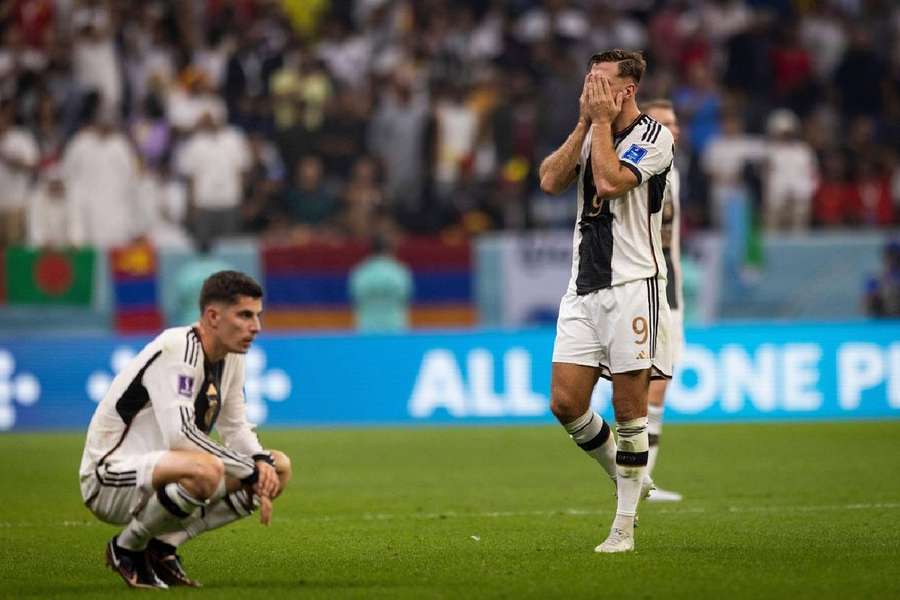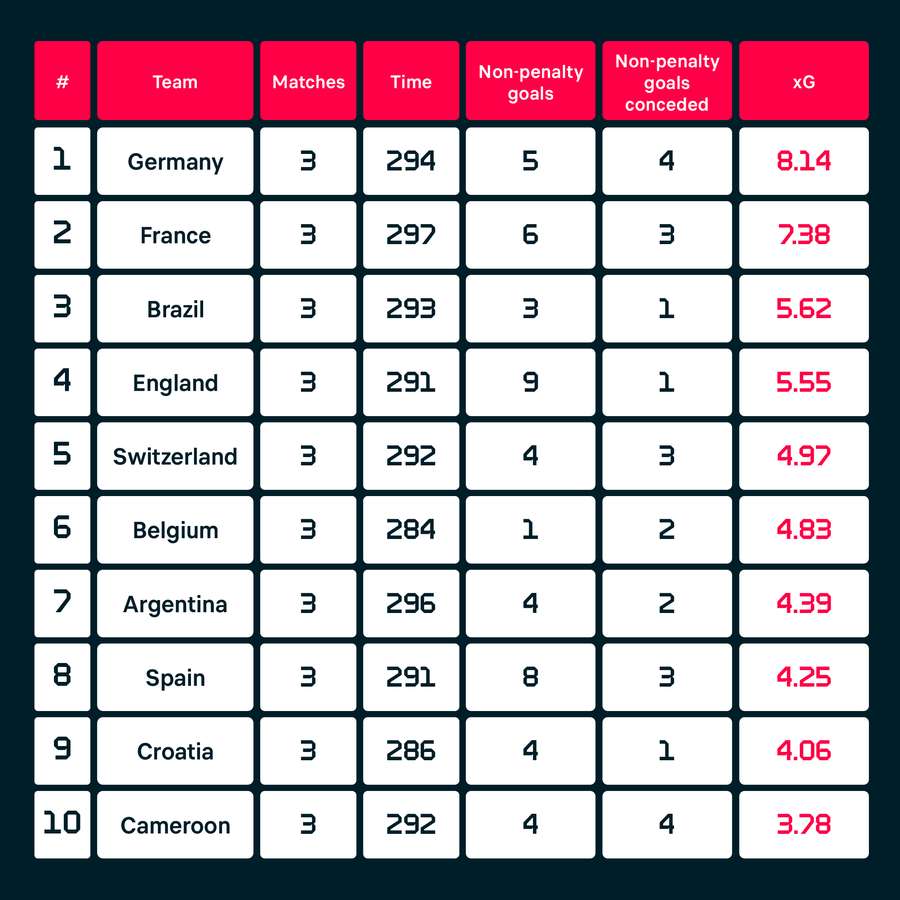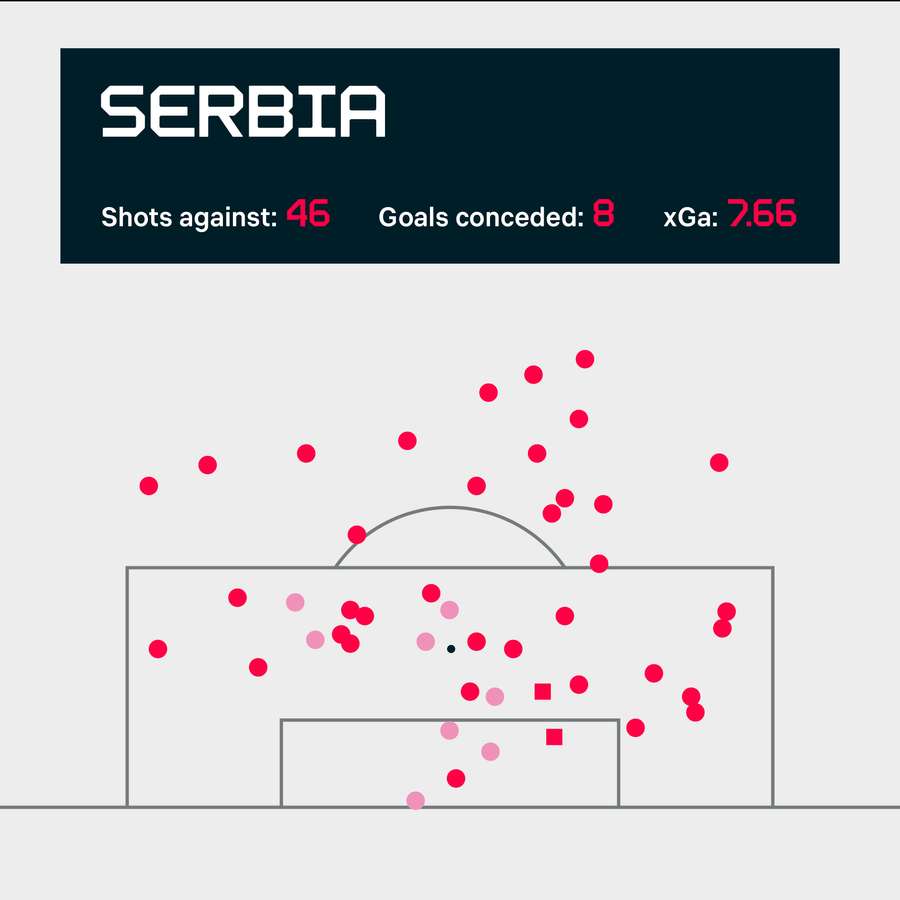11Hacks data talking points: Worst keepers, biggest surprises, and more German misery

The worst team
Costa Rica. The South American team quickly fell to the bottom of all the important team metrics, often by a huge margin behind the second-worst team.
The match between Costa Rica and Japan is probably still keeping the Japanese players up in the middle of the night.
Japan allowed their ultra-passive opponents just one shot from inside the penalty area the whole game. However, the Costa Ricans cashed in on that single chance and won by the closest possible margin after registering an expected goals score (xG) of just 0.11 - which was incidentally the second-worst offensive performance in the tournament so far.
Let's further illustrate the Central Americans' passivity through some data.
Costa Rica played clearly the lowest block in the entire tournament. Their team averaged a position of 35.69 metres from their goal in defensive actions. Cameroon, second-worst, averaged 40 metres, while the tournament average was around 46 metres. England have averaged the highest defensive block with 54 metres.
While the average team in the tournament contested every 11th opponent pass, Costa Rica contested every 28th. The second-worst in this metric, Qatar, challenged every 19th pass.
What's more, Costa Rica had the ball in possession just 31% of the time. They finished the tournament with the worst offence (along with Australia) and defence in terms of the quality of chances created/taken.
Costa Rica were truly an outlier in last place.
The most pleasant surprise
Ecuador. Their defensive performance during the qualifiers had already indicated some quality but Gustavo Alfaro's team still surprised us in the final tournament.
According to the metric of expected points, Ecuador were the sixth-best team in the group phase, helped primarily by their excellent defence. Their defence was the fifth-best in terms of the quality of goal-scoring opportunities created against them.
Their game was also characterised by sophisticated pressing - they were third-best in the tournament in terms of intensity and seventh-best in terms of efficiency. They were also among the best in terms of defensive header success (third behind France and Uruguay), and ball retrieval.
Creating chances was their undoing, however. In fact, 24 other teams in the tournament created better shooting opportunities than Ecuador.
The most shocking events
To stay with Ecuador for a moment, we should mention their near-perfect defensive performance against the Netherlands, when they allowed their opponents only two shots, neither of which came from inside the box.
In terms of xG, the game was won 1.29 to 0.05 by Ecuador. What was remarkable about that stat was that the Netherlands have only recorded less than one expected goal four times in their last 30 matches.
Since mentioning Argentina's surprising loss to Saudi Arabia is a little too obvious, our next choice for the biggest shock would be Germany's match against Japan.
The Germans' performance in that match was, in terms of xG, the best offensive display of the entire tournament so far. The next best after that match - Germany agaisnt Costa Rica.
The Germans peppered their opponents with 25 shots, and Japan were not far behind in the match, producing 12 of their own and all of them inside the penalty area. The final xG stood at 2.46 (+0.76 penalty) against 1.39 in favour of the Germans.
Despite Germany's attacking dominance, the Japanese won 2-1, laying the foundations for the most surprising group at the tournament. Subsequently, Japan took all three points from Spain and topped the group, sending the Germans - the team with the best xG of the group stage - packing.

The biggest analytical surprise
Serbia's terrible defensive performance.
There was a lot more talk before the tournament about their loaded offensive line led by Aleksandar Mitrovic (28) but Serbia's defence has been very good for a long time.
This was not even remotely shown in Qatar, however, as only Costa Rica had a worse defence in terms of the quality of chances created against them - and that was really only just.
The Serbians conceded 1.9 expected goals against (xGA) from Brazil, another 2.39 were added to their tournament tally by the Cameroonians and finally, the Swiss added 2.9 as well.
With so many big chances conceded, it is simply impossible to advance in such a tight tournament structure.

Worst goalkeepers
For many, this is also one of the biggest analytical surprises. In a model that assesses goalkeepers' saves against shots inside the penalty area, the worst-ranked player, after Iran's Hosseini and Qatar's Barsham, was Mexican World Cup phenomenon Guillermo Ochoa (37).
Yet he is one of the main reasons why Mexico managed to advance out of the group at the previous two championships. According to mathematical models, Ochoa's interventions during those two tournaments prevented four goals in a total of eight matches.
This time, however, he let in two more goals than the average goalkeeper would have let in if they had faced the same shots.
Edouard Mendy (30), who was supposed to be a key player for Senegal, is in a similar position in terms of his data. He had a poor tournament and, as a result, one of Africa's most popular teams said goodbye to the tournament in the round of 16.
You might be wondering who is doing best among the goalkeepers at the World Cup so far.
To find that out and more, keep following Flashscore.com and our series of analytical articles from the data experts at 11Hacks.
